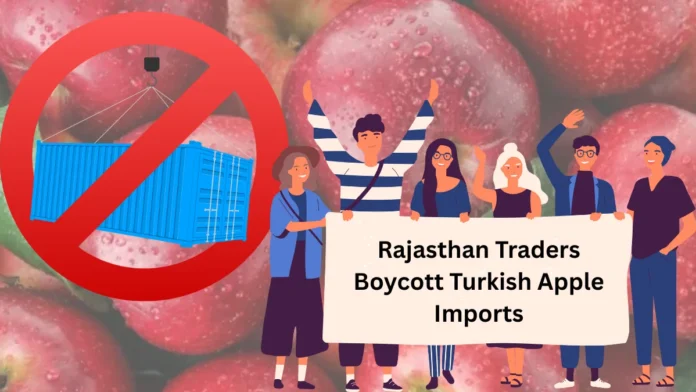Key Takeaways
- Rajasthan traders boycott Turkish apples in protest of Turkey’s support to Pakistan during Operation Sindoor.
- Turkish apples form a small share of Rajasthan’s fruit market, making the boycott more symbolic than commercial.
- Local fruit sellers emphasize patriotism over profit, turning to apples from Kashmir, Himachal, and the U.S.
- Similar trade boycotts have impacted the marble industry, with Udaipur traders halting ₹3,000 crore imports from Turkey.
- Rising India-Turkey tensions could further reshape local and national import preferences.
Turkish Apples Out, Patriotism In: Rajasthan Traders Join Nationwide Boycott
In a defiant move resonating across India’s fruit mandis, traders in Rajasthan’s Alwar, Ajmer, and Jaipur announced a complete boycott of Turkish apple imports on Saturday. Their decision follows Turkey’s vocal support for Pakistan during Operation Sindoor, India’s strategic military response in the ongoing regional tensions.
Though Turkish apples never dominated Rajasthan’s market, the boycott is gaining attention for its symbolic importance — a stand traders say is less about sales and more about national pride.
The Jaipur Fruit Mandi Union’s president, Govind Chelani, declared that they would boycott Turkish apples, stating that their nation came before their company.
Why the Boycott? A Political Move With Commercial Ripples
Operation Sindoor, launched by India in response to escalating border concerns with Pakistan, has triggered strong national sentiments. Turkey’s open alignment with Pakistan stirred unrest among Indian businesses, particularly in import-heavy sectors.
The fruit trade may seem like an unlikely battlefield, but it’s now becoming a front line of economic nationalism.
Pappu Saini, patron of the Alwar Phal Sabji Mandi Aadati Union, remarked that although Turkish apple sales were minimal in the region, remaining silent was not an option, as he believed unity held greater importance.
According to Saini, Turkish apples are imported into Rajasthan from Delhi, primarily during the March–May period. Typically, about 15 tonnes reach the region each year — a modest volume compared to the influx from other regions.
Filling the Gap: Apples from the Himalayas and Beyond
Despite cutting ties with Turkish imports, traders are confident there will be no supply crunch. Apples from Kashmir, Himachal Pradesh, and even international sources like the U.S., South Africa, and Fiji are readily available to meet consumer demand.
Chelani explained that customers generally preferred the taste and texture of Kashmiri and Himachali apples, noting that Turkish apples had never made a strong impression in the region.
Indeed, consumer preferences in Rajasthan have long leaned toward domestic varieties, known for their freshness, juiciness, and local origin.
Beyond Apples: Marble Industry Also Draws the Line
This is not an isolated protest. Earlier this year, marble traders in Udaipur — home to one of Asia’s largest marble markets — suspended Turkish imports, echoing the national sentiment.
Kapil Surana, President of the Udaipur Marble Processors Association, emphasized the seriousness of the decision, stating that the boycott had impacted business worth ₹3,000 crore. He pointed out that 70 percent of India’s marble imports came from Turkey, adding that while the decision was not easy, it was necessary.
Despite the economic implications, marble traders say they are willing to endure short-term losses in favor of long-term national interest.
Nationalistic Economics: A Growing Trend?
This incident marks a growing intersection between foreign policy and local commerce. While economic sanctions are typically imposed at the governmental level, local traders taking such independent action demonstrates rising civic involvement in geopolitical matters.
Such grassroots boycotts reflect the swelling tide of consumer nationalism — where buying decisions are no longer driven solely by cost and quality, but also by political and emotional considerations.
Rajeev Ranjan, a geopolitical analyst based in New Delhi, observed that a shift was taking place, noting that traders were increasingly acting as foreign policy players themselves. He explained that they were sending a clear message—that allegiance was of significant importance.
Will Other States Follow?
While Rajasthan’s response is leading headlines, fruit trader unions in other states are reportedly considering similar boycotts. The anti-Turkey trade mood may spread beyond apples and marble to textiles, machinery, and other products due to the increasing power of social media campaigns and nationalistic appeals.
“Today it’s apples, tomorrow it could be something else,” said Saini. “But our unity is our strength.”
Conclusion
What started as a minor shift in fruit trading preferences has grown into a broader economic message. Rajasthan’s boycott of Turkish apples is not about quantity — it’s about quality of conscience. When business and patriotism collide, traders in the desert state have made their choice clear: Country before commerce. In a globalized world where trade knows no borders, this moment serves as a powerful reminder that nationalism, too, has a place on the marketplace shelf.


